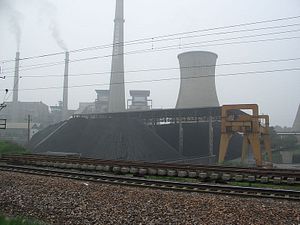The 2021 U.N. Climate Change Conference, known as COP26, concluded in Glasgow on November 13, with much fanfare about new targets and pledges to rein in carbon emissions, slow the pace of deforestation, and otherwise try to stem the spiraling increase in global temperatures. Largely absent from the cavalcade of notables and stream of announcements, however, was any significant representation by or discussion of China. This was problematic, as China’s participation is critical to any worldwide effort or climate initiative – but it also speaks to several aspects of China’s internal politics and political economy that might hamper such participation or undercut its role.
As the source of roughly 27 percent of global emissions of greenhouse gasses (the U.S. is next with 11 percent, while the 27 EU member states together contribute just under 6.5 percent), China’s position is pivotal to any potential climate solution. This fact is not lost on China’s leaders or citizens. Environmental awareness and activism have burgeoned in China over the past 20 years and its government has taken bold strides toward embracing renewable energy, promoting (and building out) public transport, limiting automobile use, retrofitting buildings and replacing equipment to improve energy efficiency, and undertaking perhaps the world’s leading program of reforestation.
Notably, President Xi Jinping has made public promises, backed up with formal pledges by the Chinese government, to achieve net zero emissions by 2060. Around COP26, these pledges were updated and improved to include faster attainment of intermediate benchmarks. But reports were still dominated by negative news.
Xi was notable among world leaders for his absence at the Glasgow conference. China’s pledges and commitments, while significant, fall far short of what has already been delivered and promised by other major states. Some pointed to COVID-19, or to the political jitters during what is an extremely sensitive year for the Chinese Communist Party (CCP), as the cause. Others were less subtle in simply assigning blame. But the real reasons are both more nuanced and more straightforward.
Chinese leaders, even Xi Jinping – his ever more hagiographic leadership campaigns notwithstanding – must carefully maintain governing coalitions across different regions, sectors, and elite factions, or else risk potentially being deposed from power. Despite all its investments in nuclear power and renewable energy, China still generates nearly two-thirds of the electricity it uses by burning coal. Coal is abundant and cheap in China, and is at the core of important regional economies. Millions of miners every year dig out more than 50 percent of the world’s coal across thousands of Chinese mines. Many areas of north-central China (and parts of the northeast) depend heavily on the sector. Moving more quickly away from coal would thus carry significant social costs, in addition to sparking higher energy prices.
What’s more, China’s coal-producing regions are critical to the political coalition Xi has cobbled together since assuming power in 2012. It is also likely not entirely coincidental that his anti-corruption campaigns have ensnared by far the most targets in this region, or that favorable news coverage of Xi frequently emphasizes the time he spent as a young man in the coal-producing region of northern Shaanxi Province. Political support from sectors like coal, dominated by state-owned industrial behemoths, is also seen as key. Unlike his predecessors, who actively looked to jettison aging state enterprises and their workers while aggressively pursuing China’s integration into the global economy, Xi likely cannot afford to lose the support of state-owned enterprises, especially as he continues to alienate many regions and sectors with stronger links to globalization and international trade.
Then there is the question of consumption. China has sought for decades to reduce the share of aggregate investment in its GDP, relative to consumption. Returns on investment are among the lowest in the world, rates of savings are generally seen as excessively high, and consumer sentiment has long been relatively anemic. Further increasing investment in transitioning away from coal, while potentially also pushing up consumer prices, is thus not as attractive to Chinese leaders as it may appear from a distance.
Delivering consistently high rates of GDP growth and demonstrably improving living standards for citizens and consumers is at the core of the CCP’s strategy of “performance legitimacy.” But China’s development model has been decreasingly effective since at least the 2008 global financial crisis. Grasping for new tactics and strategies for growth, while also endeavoring to maintain its grip on power and transition to a new era of entrenched (and increasingly personalistic, even charismatic) authoritarianism, the party is loath to commit to anything so risky as faster achievement of climate goals – even if that may mean more islands become submerged by rising seas before it finds the stones it is feeling for in the proverbial river.

































